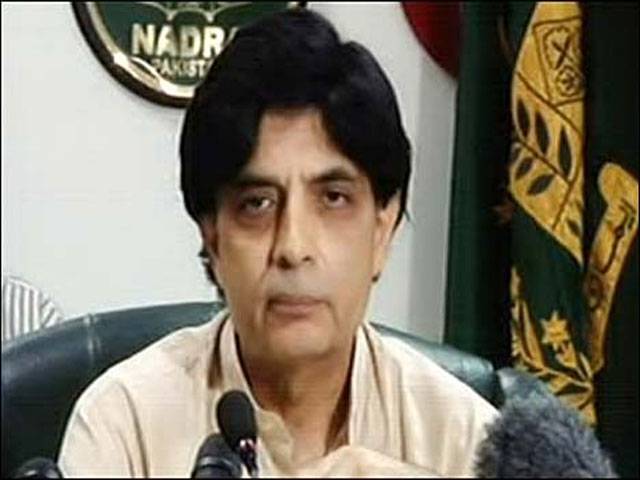ISLAMABAD - The Election Commission of Pakistan (ECP) on Monday rejected the statement of Interior Minister Chaudhry Nisar Ali Khan over the use of magnetised ink during the general elections in the country.
ECP Secretary Ishtiak Ahmed said that magnetised ink was used during the general elections according to the guidelines of National Database and Registration Authority (Nadra).
The secretary said the record over the use of magnetised ink along with the details of despatch were available with the commission. He said 450,000 magnetised ink pads were used during the elections.
The ECP secretary also stated that the magnetised ink was prepared following the directions of Nadra, adding that the ink contained iron particles.
Addressing media people on Sunday, Interior Minister Nisar said it had been decided with the approval of Prime Minister Nawaz Sharif that administrative control with reference to verification of thumb impressions would be transferred to the Election Commission for three months for transparency.
He said an office order would be issued after meeting with the Election Commission secretary, directing Nadra, which was working under the Interior Ministry, to transfer control regarding election matters to the Election Commission for three months.
He said Nadra chief Tariq Malik’s termination was according to law and he was reinstated following the court orders.
Meanwhile, The Supreme Court on Monday sought para-wise comments from the Election Commission of Pakistan on the PTI application, demanding implementation of the SC judgment in the Workers Party Pakistan case.
A three-judge bench, headed by Chief Justice Tassaduq Hussain Jillani and comprising Justice Amir Hani Muslim and Justice Ejaz Afzal, hearing the PTI petition under Article 184 (3) of the Constitution, directed the Election Commission of Pakistan secretary to submit para-wise comments. The court also called a report from election tribunals about the non-compliance with the (thumb-verification) order in respect of NA-125, Lahore, and NA-154, Lodhran, within a fortnight after which it would be fixed for hearing.
Hamid Khan, representing the PTI, requested the court to direct the election tribunals to decide the PTI cases expeditiously, because they (ETs) have not complied with the orders, as they have to decide a case within 120 days. He prayed to the court to order verification of thump impressions.
“We would not like to comment on the merits of the case. In the interest of justice, the ECP secretary is directed to file para-wise comments, besides ordering the election tribunals, hearing cases of NA-125 and NA-154, to submit a report in two weeks,” the JCP remarked.
As Hamid Khan was pleading the case, PTI Chairman Imran Khan came to the rostrum and sought permission to address the bench, the chief justice told him that it was not the practice of the apex court to allow the petitioner to speak in the presence of his counsel. However, the court told him there were two aspects of the case, political and constitutional, and if he had the political grievances, he would not be allowed, but if his counsel had missed any constitutional point, he could speak.
Imran Khan said what had happened in the general elections was in the knowledge of everyone, adding it would not leave good impression for the future generation. He contended that the election tribunals had not given any relief to PTI.
Justice Jillani said: “The Supreme Court is the court of precedents and if we allow the PTI application, people from Karachi to Peshawar will come to us with the prayer to hear their petitions as well. If we do not hear their petitions, they will say discrimination is being done to them. We have laid down parameters of the SC jurisdiction under Article 184 (3) in the full court reference.”
Hamid Khan argued that previously the high court judges in tribunals used to hear the election appeals against returning officers, but now the retired sessions judges hear the appeals in the election tribunals, who could not decide the cases due to pressure, adding two judges of the tribunals had resigned on account of the pressure.
Hamid Khan argued that the Supreme Court judgment in the case of Workers Party Pakistan Vs Federation (PLD 2012, SC 681) has not been implemented. He stated that in the judgment the court had made some declaration, instructions, directions and observations to ensure that the general elections be held in a free, fair and transparent manner.
He alleged massive rigging was committed in the general elections and Pakistan Tehreek-e-Insaf was its major victim. He referred to various incidents of irregularities in four constituencies – NA-110, Sialkot, NA-122, Lahore, NA-125, Lahore, and NA-154, Lodhran.
He prayed to the court to order recounting of votes in the four constituencies as it would give a broad idea of rigging which, according to him, eroded the sanctity of the vote.
As the court asked him whether the petition was maintainable under 184 (3), he replied that the issue related to fundamental rights of the Constitution mentioned in articles 17 and 25.
Wednesday, April 17, 2024
Magnetic ink excuse gets thumbs down
SC QUESTIONS THUMBPRINT-VERIFICATION DELAY

8:54 PM | April 16, 2024
8:53 PM | April 16, 2024
Pride and hype as F1 roars back to China after Covid absence
10:36 PM | April 16, 2024
No let-up in Karachi street crime incidents
10:35 PM | April 16, 2024
Stock market today: Most of Wall Street weakens again as Treasury yields rise more
10:34 PM | April 16, 2024
Muslim K-popstar Daud Kim buys land to build mosque in South Korea
10:33 PM | April 16, 2024
Punjab Stadium unavailability derails National Challenge Cup 2023 Final Round
10:28 PM | April 16, 2024
Political Reconciliation
April 16, 2024
Pricing Pressures
April 16, 2024
Western Hypocrisy
April 16, 2024
Policing Reforms
April 15, 2024
Storm Safety
April 15, 2024
Democratic harmony
April 16, 2024
Digital dilemma
April 16, 2024
Classroom crisis
April 16, 2024
Bridging gaps
April 16, 2024
Suicide awareness
April 15, 2024
ePaper - Nawaiwaqt
Advertisement
Nawaiwaqt Group | Copyright © 2024





